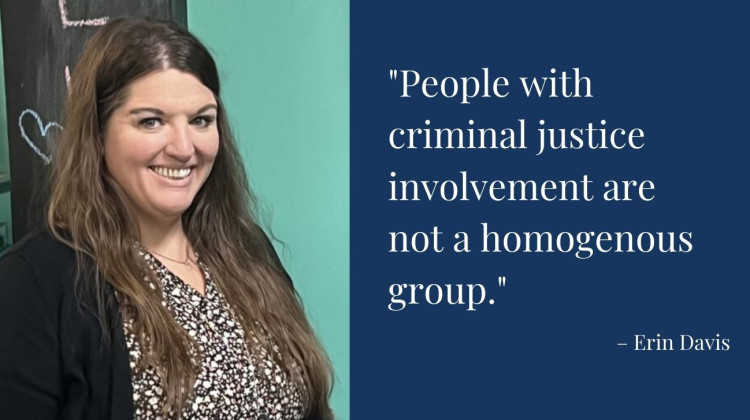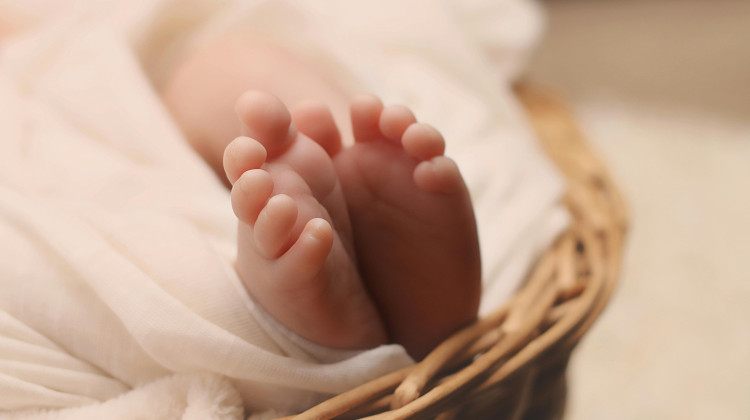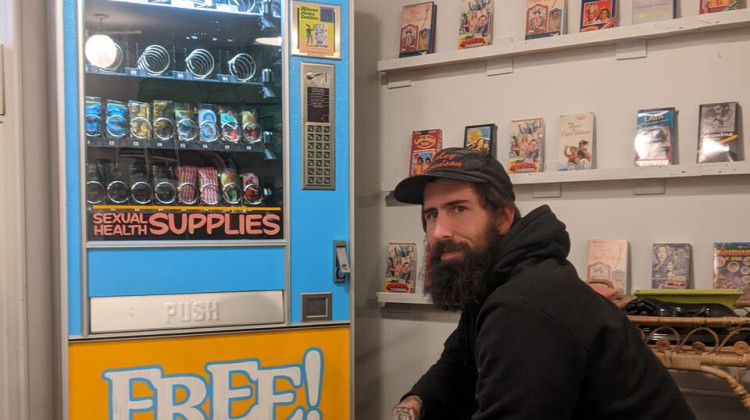
Erin Davis works as a peer recovery coach at PACE in Indianapolis. She helps people leaving the criminal justice system re-enter society.
Submitted photoMany people who re-enter society after incarceration face barriers that make it hard to find and keep a job and be successful. They also face stigma.
Erin Davis is a peer recovery coach at Public Advocates in Community re-Entry, or PACE, an Indianapolis-based organization that works with people impacted by the justice system. The 38-year-old said her re-entry work is informed by her own experience with substance use, which led to her serving time in the criminal justice system.
Davis spoke to WFYI health reporter Darian Benson as part of WFYI’s Voices of Recovery and Hope series. Click here to listen to the full series.
This transcript has been lightly edited and condensed for length and clarity.
Some of the barriers for somebody re-entering … there's all the stuff that you can't see: the mental health; the still being the same person that went in but now, on paper, if someone were to pull up your human file as a citizen, or as just like a person trying to do life, like everybody else, you have all these marks against you. All these assumptions can get made, all the stigma that's wrapped around that.
I remember just always thinking, “God, the me on paper…” I'm the kid that never had a detention. If there was extra credit, I was going to do it, if they needed a volunteer I raised my hand.
In the wake of some trauma, my coping was limited. And I was a person predisposed, in whatever way – I'll never know, and I don't need to know – for addiction and to use substances to numb. It wasn't a party, it was just to feel nothing. And to now be a person with a felony. It’s just a bizarre juxtaposition.
So there's all of that self-punishing, self-loathing, self-sabotage, you know, that you bring out with you. And it just erases everything else good you've ever done in your life.
Now all of a sudden, you're just this thing. You're just your worst day or your biggest mistake or your most humiliating moment, your weakest moment or your most scared moment.
Some of the things that we don't think about until you're on my side of things, post incarceration … for nonviolent … nobody was hurt. And I took all of the punishment.
But what I did not realize what was going to follow me forever was the fact that a felony on my record, apparently, in practice, precludes me from volunteering at my son's school. OK. But I can't go eat lunch with him? OK. I'm not asking to drive the bus. The charge was before my son was even in kindergarten.
People with criminal justice involvement are not a homogenous group. So for people to think felon, people automatically go to violent, stranger-on-stranger crime. People automatically go to the thing that happens the least to box you in.
Remember that we criminalize poverty, that we criminalize a lot of “other.” We criminalize Black and Brown people for things that other people, White people, are not criminalized for.
So just remember that we're all playing a different game with a different set of rules and expecting it all to come out the same. “Well, I did, so they could have” is a really, really close-minded and harmful way to navigate this life.
Because we're all in a relationship with each other. Whether we like it or not, the guy that cut you off in traffic, you know, or the person you hand the $5 bill to that dropped it in front of you in the parking lot – we're all in this together.
Contact WFYI health reporter Darian Benson at dbenson@wfyi.org. Follow on Twitter: @helloimdarian.
This series was created in response to community feedback around substance use issues collected by Side Effects Public Media’s Brittani Howell. You can read more about her substance use-related community engagement work here.
 DONATE
DONATE






 View More Programs
View More Programs

 Support WFYI. We can't do it without you.
Support WFYI. We can't do it without you.